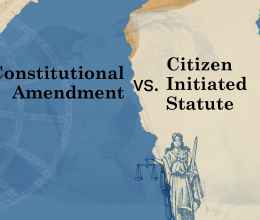This article was originally published in the Ohio Capital Journal on 11/3/2023.
Nov. 7 is rapidly approaching and that means Ohio voters only have a handful of days to decide how they will vote on two critically important Statewide Issues. At its simplest, Issue 2 is a ballot initiative to legalize marijuana for adult-use in Ohio, regulating it just as the state does alcohol.
Many Ohio lawmakers talk a good game about wanting to pass criminal legal system reform, but each session the political machine churns, and bills are cast aside. Even with bipartisan support, many drug policy reform efforts are whittled down to low-hanging fruit compromise bills — and it is often a herculean effort by sponsors to get these bills passed. At the same time, sentencing enhancement bills continue to be introduced and passed, session after session.
While legislation at the Statehouse stalls and movement occurs intermittently at the local level, Issue 2 would assist in creating an equitable playing field statewide. As an example, in 2019, Columbus City Council passed their own ordinance decreasing the penalties for marijuana possession compared to state of Ohio law. Although this is a positive step, its benefits reach only a specific geographic area. It also creates blurry lines within the criminal justice system, as law enforcement may technically cite individuals under Ohio law. If we are taking steps forward to reform our broken system, we should walk that path collectively as a state.
We the people have the power to pass the marijuana policies that we want. Criminal records mark people for life, making it hard to get a job, an apartment, and more. For decades, the ACLU has spoken out against the ineffective and failed “War on Drugs.” In actuality, the war on drugs is really a war on people — and it’s an inequitable one. A 2020 ACLU report found that Black people are 3.4 times more like to be arrested for marijuana possession than white people in Ohio. Issue 2 will help end unfairly harsh consequences for many marijuana offenses.
We strongly believe people who have been harmed by the enforcement of marijuana prohibition must have a place in the bourgeoning marketplace created by legalization. In addition to allowing adults 21 and older to buy and possess up to 2.5 ounces of cannabis and 15 grams of concentrates, as well as, grow a maximum of six plants individually and up to 12 in a household with multiple adults, Issue 2 also creates an impactful tax structure. Part of the newly created 10% adult-use tax will go towards a “Social Equity and Jobs Program” in the “interest of remedying the harms resulting from the disproportionate enforcement of marijuana-related laws and to provide financial assistance and license application support to individuals most directly and adversely impacted by the enforcement of marijuana-related laws who are interested in starting or working in cannabis business entities.”
According to a report by the Drug Enforcement and Policy Center at The Ohio State University, potential annual Ohio tax revenue from adult-use cannabis ranges from $276 million to $403 million after five years of operations. Thus, if operated effectively, this new fund could go a long way in reducing harm from failed marijuana policies of the past.
Moreover, Ohio law and policy is outdated and out of line with the majority of people across the country and right here in Ohio. A recent Gallop Poll noted that 50% of those surveyed stated that they had used marijuana at some time. Marijuana use is not a taboo issue. Likewise, Ohio will not be the first and surely will not be the last state to legalize marijuana for adult-use. 23 states, two territories, and the District of Columbia have already legalized marijuana for recreational use. This is not surprising as a 2022 Pew Research poll highlighted 59% of Americans think marijuana should be legal for recreational use, and these views are largely unchanged since 2021.
Ohio is no outlier. The Coalition to Regulate Marijuana Like Alcohol leading the Issue 2 campaign published an August 2023 survey of 843 likely voters which noted 55% of respondents will likely vote yes versus only 34% who will likely vote no on Issue 2. The tide has turned.
Issue 2 will also bring relief to those who need it as soon as they need it. While medical marijuana is legal in Ohio, for some, access is still a challenge. It’s high time to cut ties with failed marijuana policy and simply regulate adult-use like a growing number of states. Issue 2 is chance for Ohio voters to decide if they want to take that step forward.








